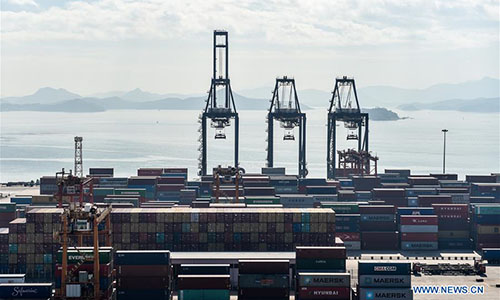More exports from Chinese mainland processed at ports in Guangdong instead of HK
By Li Xuanmin in Shenzhen Source: Global Times Published: 2020/8/31 16:13:40

Photo taken on Nov. 29, 2017 shows a wharf in Yantian port zone of Shenzhen port in south China's Guangdong Province. Container throughput at Shenzhen Port saw a 5.13 percent growth year-on-year in 2017, reaching 25.2 million Twenty-foot Equivalent Units (TEUs). (Xinhua/Mao Siqian)
About 60-70 percent of the Chinese mainland-made goods for export that originally transited at Hong Kong are now instead processed at Shenzhen and Guangzhou, South China's Guangdong Province, due to the soaring human costs in the special administrative region (SAR) and new circumstances that have affected foreign traders' confidence, industry insiders told the Global Times.
Nevertheless, Hong Kong's position as a global free trade port remains irreplaceable given its overwhelming edge in free currency convertibility, and efficiency of cargo delivery, observers said.
As Hong Kong has gradually restored social tranquility and stability after the implementation of the iconic national security law, some traders on the Chinese mainland started to reconsider transiting their goods at Hong Kong, the Global Times learned.
An employee of a Shenzhen-based leading drone-maker, who spoke on condition of anonymity, told the Global Times that bulk orders of its drones have been shipped abroad via airports in Shenzhen city since 2019.
"Some flights in Hong Kong were cancelled last year due to the violent anti-government protests in Hong Kong, which, combined with a slew of other unexpected events, prompted us to choose air freight from Shenzhen airport instead," the employee said.
He noted that there was a point at which the transportation capacity in Guangdong Province had failed to catch up with rising market demand, sometimes leading to stockpiles and queues at local ports.
Huang Jinyun, general manager of Shenzhen-based smartwatch maker Aibaohu Tech Co, noted that the company has started shipping a small portion of its smart watches to the US and Europe directly from Shenzhen's port in the past two years.
"Hong Kong holds a number of major consumer electronic shows every year, but many foreign clients fly to exhibitions in Guangzhou and Shenzhen and place orders directly due to concerns over the social unrest in Hong Kong. This dealt a blow to Hong Kong's trade industry," Huang told the Global Times.
Hong Kong has long served as an important transportation hub for the Chinese mainland, and played an important role in China's reform and opening-up. During the first half of 2020, the SAR's foreign trade volume with the Chinese mainland dwindled 13 percent to $116.35 billion, according to data from China's Ministry of Commerce.
However, Huang noted that a majority of the company's products will still be transported via Hong Kong's airports due to the reach of the city's extensive air network.
"There are more flights in Hong Kong. The arrangement of air cargo is more flexible, and the cost is comparably cheaper," Huang said, noting that "a considerable number" of foreign clients still approach Hong Kong's trading agencies for products manufactured in the Chinese mainland.
A veteran foreign trade industry insider, who is also an executive at a local television sets manufacturer, told the Global Times that Hong Kong's advantage lies in providing professional and efficient foreign trade and financial services.
"There is plenty of room for Hong Kong and neighboring Shenzhen city to better cooperate," the executive noted. "Their relationship in the foreign trade industry has been complementary in the past and will be closer in the future, especially after implementation of the national security law that safeguards Hong Kong's stability," the source added.